By Jacob Smessaert and Julia Spanier.
Can degrowth theory contribute valuable new perspectives to the thinking and doing of food system transformations beyond capitalism in the Global North? Or is it doomed to repeat questions already answered by other critical activists and thinkers within the food system, pretending novelty by merely exchanging buzzwords in titles?
Introduction
Degrowth is both an academic critique of the fundamental unsustainability and social injustice of infinite economic growth, and a political proposal for a radical restructuring of societies in the Global North. As such, degrowth scholars have been busily exploring the different sectors in need of restructuring, asking what degrowth urban planning may look like, how work would be organised in a degrowth society, what a degrowth vision for housing would be, or how we produce and consume food in a post-growth future (see here and here).
Identifying ourselves as researchers whose interests bring together degrowth thinking and agri-food studies, we are both intrigued and hesitant with regards to the last topic. As our research is deeply indebted to a long legacy of political struggles and thinkers within the food system —from peasant, agroecology and food sovereignty movements to critical agrarian studies and food regime theorists— we find ourselves compelled to ask: Can degrowth theory contribute valuable new perspectives to the thinking and doing of agri-food transformations beyond capitalism? Or is degrowth engagement with food doomed to repeat questions already answered by other critical thinkers, by the social movements and food activists themselves, creating a new ‘niche’ and pretending novelty by merely exchanging buzzwords in titles?
When we were asked to contribute a presentation on degrowth to a lecture on critical food system thinking, alongside perspectives from political ecology (by Kenza Benabderrazik and Gabriela Villavicencio Valdez) and food as a commons (by Jose Luis Vivero Pol), we were confronted with exactly those questions.
Here, we share some of our humble reflections on a potential response, many of which are also the fruits of day-to-day discussions with our colleagues at Utrecht University— Leonie Guerrero Lara, Guilherme Raj, Laura van Oers and Giuseppe Feola, together with whom we have written a research agenda on degrowth and agri-food systems.
A degrowth diagnosis of the root causes behind unsustainable food systems
From a degrowth perspective, capitalism and the hegemony of growth are the root drivers of unsustainability in the currently predominant industrial food system. Evidently, this analysis is far from new. In the Nyéléni Declaration of the International Forum on Food Sovereignty (2007), a gathering of “more than 500 representatives from more than 80 countries, of organizations of peasant/family farmers, artisanal fisherfolk, indigenous peoples, landless peoples, rural workers, migrants, pastoralists, forest communities, women, youth, consumers and environmental and urban movements” in the village of Nyéléni in Mali, movement representatives wrote:
“What are we fighting against? Imperialism, neo-liberalism, neo-colonialism and patriarchy, and all systems that impoverish life, resources and ecosystems, and the agents that promote the above.”
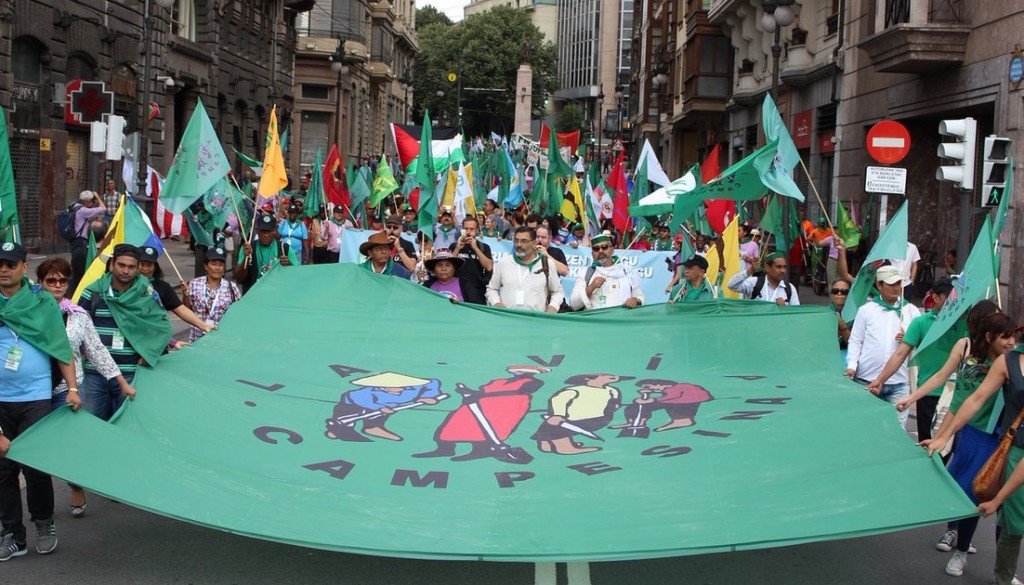
March for food sovereignty in Bilbao, July 23th 2017. Source: tv.viacampesina.org
Degrowth thinking cannot add anything new here with a mere critique of capitalism at the foundation of today’s hegemonic food system. Yet, it has the potential to put specific aspects of capitalism into the spotlight. It can foreground the hegemony of growth within capitalism, emphasising the persistence of growthism in all spheres of social, economic and cultural life, and across all sectors. It may foreground the interlinkages between the hegemony of growth in energy, housing, transport and other sectors on the one hand, and the food sector on the other. It may highlight the ways in which a cultural ideology of growth perpetuates unsustainability within and far beyond our food system. And it can thereby complement food movements’ long-held conviction for the necessity of a radical food system transformation with a broader vision for a societal, including economic, transformation.
To some extent, this has already started to happen. For instance, the High-Level Panel of Experts (HLPE) of the UN Committee on World Food Security (CFS), framed its report on the engagement of youth in food systems within a broader theory of change towards “economies of well-being”, referring to “policies that go beyond a growth-first approach to also consider the principles of ecological economics, de-growth and resilient economies”.
Crucially, when informing Global North transformations to such economies of well-being, degrowth activists should be explicit about, and continue to learn from, the various epistemologies of the Global South (buen vivir, ubuntu, kawsak sacha, etc.) that have informed degrowth conceptions of the good life within ecological boundaries. This does not only mean that degrowth is a paradigm amongst a pluriverse of other approaches, but rather that, in its very conceptualisation and application to Global North contexts, degrowth must, as Padini Nirmal and Dianne Rocheleau suggest, “transcend its current limitations” and learn from other territories, epistemologies and ontologies.
These decolonial degrowth approaches have emerged in response to critiques that degrowth is a very European concept that risks becoming hegemonic and co-opting other discourses on alternative societies and transformation pathways. Indeed, beyond the core critique of capitalism, there has been a growing recognition that feminist and decolonial perspectives should be foundational to any theory of transformation, extending the critique of capitalism to its intersections with patriarchy and structural racism (see here, here, and here).
It would be wrong, however, to argue that degrowth is particularly strong in its feminist and decolonial critiques and self-critique, especially compared to other movements and communities. This is why we do not think degrowth is particularly qualified to add much to the existing feminist, queer and BIPoC struggles within the critical food studies and food sovereignty movements. However, we express the hope that the strengthening of feminist and decolonial debates within the degrowth community might further reinforce these struggles, as fights for the rights, visions and voices of BIPoC, women, and LGBTQI+ in agri-food systems are far from won.
New and unusual alliances
Degrowth’s analysis of structural growthism entails the potential for a variety of alliances, some of which appear straightforward while others may first need to disrupt ingrained neoliberal mentalities.
Degrowth’s spotlight on structural growthism equips it with the capacity to make explicit what has long been implied in food movements’ criticism of “all systems that impoverish life”. For example, from a degrowth perspective it is counterproductive to exclusively blame conventional farmers for the nitrogen- and biodiversity-crises that have sprouted worldwide.
Focusing on the many pressures and demands the capitalist growth economy puts on all food system actors, on the long history of political decisions in favour of productivist and extractivist agricultural systems, degrowth gives a clear explanation why singling out individual culprits within the food system is a distraction from the actual conversation —about dismantling our capitalist economy— that we ought to have. Jan Douwe van der Ploeg has thoroughly analysed how conventional farmers in the Global North have both been formed by capitalist policies and have by now come to internalise capitalist subjectivities. As such, they are neither just victims of capitalism nor just agents of environmental destruction, but both at the same time.
Here, degrowth has the potential, and to some degree responsibility, to advocate for a shared problem framing around growthism. This would offer an alternative struggle to the many conventional farmers who have so far been embracing rural populism in their protests against the societal blames and demands placed on them— a trend which has already been exploited by the far-right. Many of these farmers have not yet started to question the fundamentally flawed economic system and its ideology of industrial farming they embrace.
While alliances with conventional farmers seem utopian at this point, a similarly urgent but more intuitive alliance still needs to be forged with established peasant, food sovereignty and agroecological movements. These movements have been equally affected by the strong polarisation between environmental and smallholder farmers movements we are now witnessing in various European countries. We believe that degrowth can explicitly counteract this alienation. To the ecomodernist fantasies promoted by some environmental activists in the Global North, degrowth can, and should, respond with an analysis of power in perpetuating destructive capitalist food systems, and elevate the importance of smallholder farming—and food sovereignty—in ecologically sound and sustainable societies.
Degrowth demands a deep collective effort: a diverse range of intersecting actions and strategies towards a systemic transformation of the very foundations of our societies. Again, this needs to happen through new and also unusual alliances between actors that, on the surface, may not have the same interests. An example of such alliance can be found in France’s “Soulèvements de la Terre” (Earth Uprisings) where climate activists, radical environmentalists, peasant farmers and agro-ecological labour unions converge in direct actions against ecocidal infrastructural projects, and against the privatisation of water. While these alliances are not without conflicts nor diverging interests, their success and ensuing state repression show that they have the capacity to actually threaten incumbent powers and the socio-economic systems they uphold.
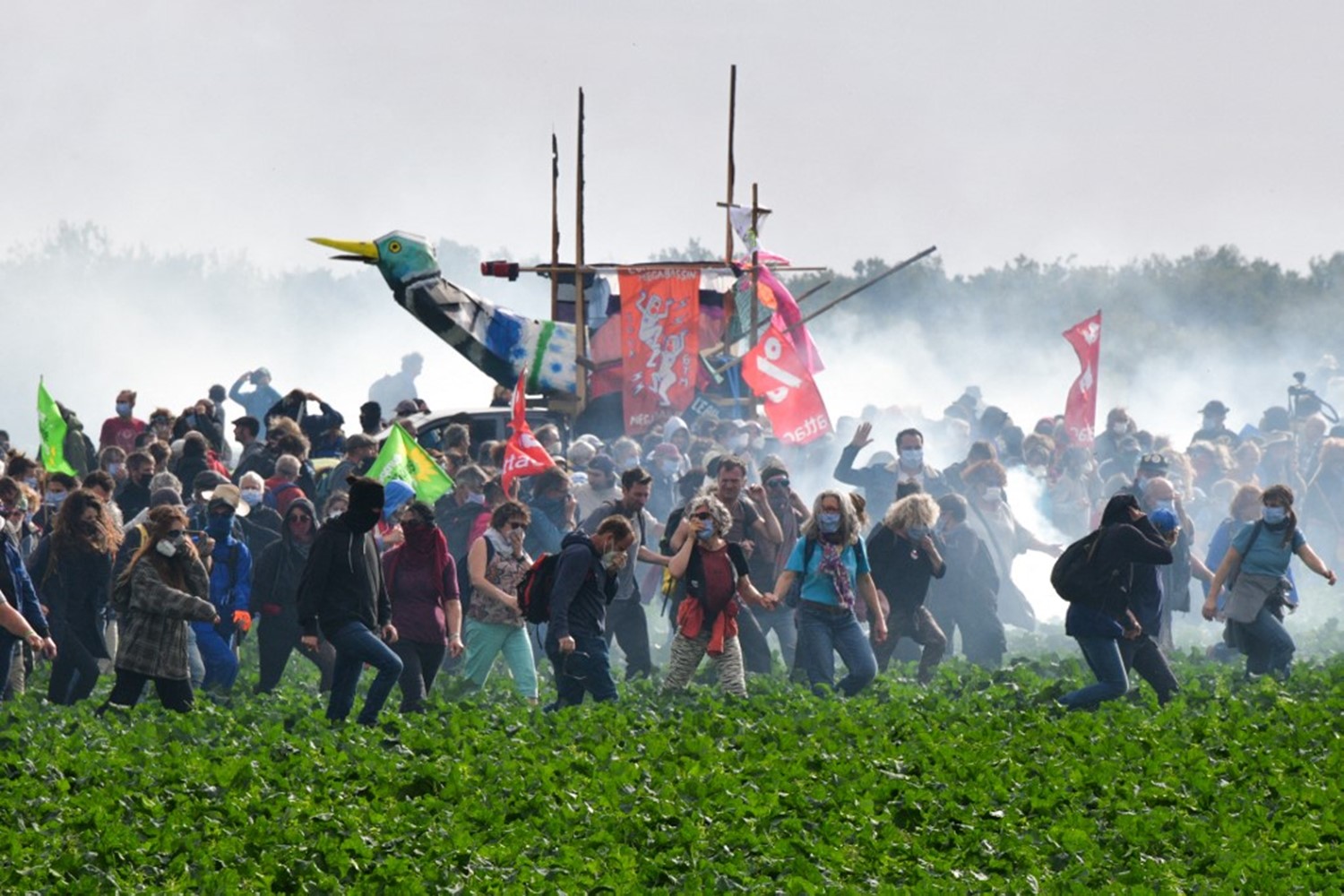
Activists trying to occupy a water retention pond during an action of Soulèvements de la Terre. Source: Xavier Leoty (AFP)
Degrowth strategizing: pathways for food system transformation
Recently, degrowth debates have shifted from a diagnosis of the unsustainable present, and visions for alternative futures towards the strategic question of how to get there (see here, here, and here). From a degrowth perspective, we may ask how individual sectors need to change, which role cross-sectoral interdependence and spill-overs play, and which structural obstacles need to be overcome—and how all these changes might eventually come about. We think that this strategic turn might define a concrete addition that degrowth scholarship can bring to existing debates in critical agri-food communities.
A specific inquiry into degrowth transformations of the agri-food system may analyse which institutions, rules and practices perpetuate growthism within this system, and strategize pathways on how to overcome them. As we explain above, the first, diagnostic step in this analysis will not necessarily bring novel results: even without a focus on the growth economy, critical food movements have long identified capitalist land ownership structures, seed reproduction systems, economies of scale and dependencies on the agrochemical industry as institutions that perpetuate injustice and ecological destruction in the food system.
However, degrowth’s explicit focus on the workings of growth-driven capitalism might be useful to critically assess the transformative potential of different solutions at hand. For instance, as Silvio Cristiano and colleagues show in their analysis of a community-supported agriculture initiative in Italy, a degrowth perspective may inform critical self-reflections about these initiatives’ entanglement with capitalism and about potential ways to unlearn and unmake them.
Circling between grassroots activism and institutional change, current degrowth debates about tactics and methods for change are useful here, as they represent a broad range of political traditions held within the degrowth community (from anarchists to social reformers). These explicitly strategic considerations might bring useful impulses to the agri-food community. What is (or can be, or should be) the role of the nation-state in transformations? Should we collaborate with its institutions, work against them, make them obsolete, destroy them? What type of change is needed, and how does meaningful and sustained change occur? In times of social-ecological breakdown, how fast does change need to happen and what does this mean in terms of strategy or legitimate forms of political action (for a discussion, see here)?
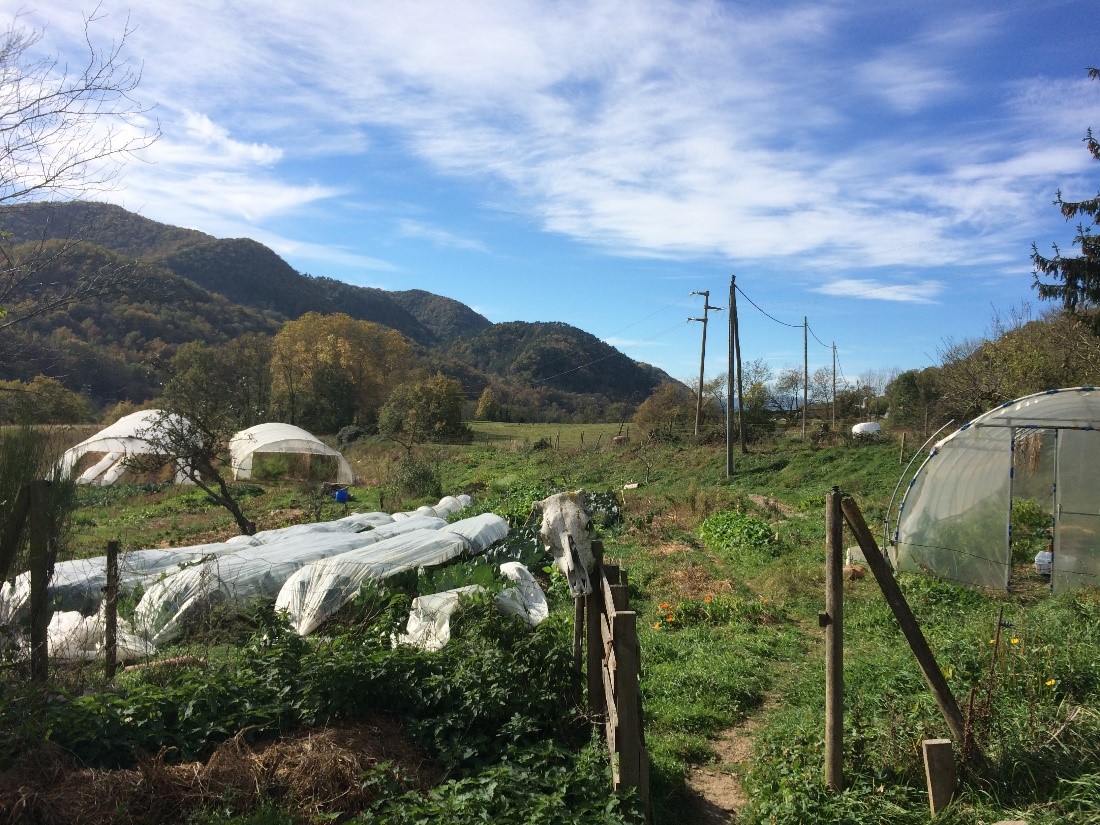
An agro-ecological collective farm in the Catalan Pyrenees. Source: Jacob Smessaert
Then, degrowth inquiries into other sectors (e.g. housing, energy, mobility) may direct attention to cross-sectoral implications on transformations of the food system. For instance, what leverage points and opportunities does a degrowth transformation in the housing sector offer that might positively impact the agri-food system? Which implications would a housing reform that limits or freezes rent prices have on food consumption practices? What would the generalisation of reduced working weeks (say, 24h per week becoming the new standard) mean for the food system? When people have more time to engage in food initiatives, how does this change the relationship between consumers and producers? When workload reduces and people have more time to cook and eat together, how do societal expectations on food availability and prices change?
Finally, these intersectoral and structural perspectives remind us that all pathways for transformation necessarily start from within capitalism. Actors of degrowth transformations of the agri-food system (grassroots movements in particular) usually struggle to survive in a socio-economic system that prioritises market exchange, competition, private property and the accumulation of capital. There is always a risk of capitalist co-optation of these initiatives, meaning that capitalism usually integrates its critiques and easily adapts to changing circumstances. An obvious example of this are the ways in which big supermarkets now advertise for ecological and local food in a bid to co-opt peasant ecological farming and claim a growing market-share of ecologically ‘responsible’ consumers. How can grassroots food movements and initiatives resist these tendencies? Here, we believe that an explicit anti-capitalist reading of degrowth is necessary, as this allows for continuously keeping a focus on the movements, trends and frontiers of capitalism.
Conclusion
We believe degrowth can usefully contribute to the doing and thinking of food system transformation in the Global North in three main ways. First, with a specific emphasis on cross-sectoral and structural hegemonies of growth, nurtured by continued learning from epistemologies from the Global South. Second, by proposing a broad problem framing to forge new and unusual alliances in times of growing alienation between environmentalist and agrarian struggles. Finally, through its explicit consideration and growing debate on adequate strategies and tactics for societal change.
Yet, degrowth will only be able to make these contributions insomuch as it does not try to answer questions that have already been tackled by others, nor appropriate topics or struggles just for the sake of advancing its own political project. For instance, there is clearly no need to theorise what degrowth farming practices would look like, as this is already shown by agroecology.
In this light, it is also important not to lend to degrowth strengths that it does not possess. A lot more work is to be done before we can consider degrowth to be particularly strong on feminist and decolonial critiques of capitalism.
While it remains vague, to this point, what the degrowth social movement actually is and what its objectives, let alone concrete actions, are, it is relevant to enquire how the degrowth movement does or could connect to established social movements that strive for food system transformation beyond capitalism. Through our research and activist praxis, we have observed some hints of connections and intersections, but alliances or synergies at the movement level remain largely hypothetical for now. This has much to do with degrowth having difficulties breaking out of its gated academic, European community and collectively deciding on directions and concrete strategies for enacting social change.
Paramount to such movement connections, we believe, is that they be made humbly and recognise the long, hard, and embodied work that peasant, food sovereignty and agroecology movements have been doing on the ground for decades, without pretending to bring overarching answers to other movements nor co-opting the particularities and autonomy of their struggles.
Similarly, it will be important to concretely identify how degrowth and respective other movements are complementary and can create synergies. Leonie Guerrero Lara and Julia Spanier engage in such an exercise in a paper in press, investigating the potential for a coalition between the community-supported agriculture movement and degrowth in Germany.And again, any such coalition should be forged without pretension nor hubris on the side of degrowth, through learning rather than prescribing: in the Zapatista spirit of “preguntando caminamos”, we walk while asking questions.
Julia Spanier (she/her) and Jacob Smessaert (he/him) are PhD-candidates researching agricultural grassroots initiatives and the unmaking of capitalism at Utrecht University (the Netherlands). Julia has been engaged in local and transnational food sovereignty groups and networks, including in the Civil Society and Indigenous People’s Mechanism (CSIPM) for Relations with the UN Committee on World Food Security (CFS). Jacob is active in different degrowth and food autonomy collectives and aims to become an agroecological farmer after completing his PhD.
This blog post is based on the lecture “Degrowth in Food Systems” that Julia and Jacob were invited to give as part of the (online) After Development Lectures organised by the Erasme Jean Monnet Centre of Excellence on Sustainability (13-17 December 2021). The authors thank Eduard Nedelciu for the invitation to the lecture and Kenza Benabderrazik, Gabriela Villavicencio Valdez and Jose Luis Vivero Pol for the interesting discussion.
Top (profile) image: Food waste artivism at the Dutch supermarket chain Albert Heijn, as part of an ArtLab hosted by Anita Horváth (http://anitahorvath.com/) and Betina Abi Habib (https://betinaabihabib.com/) at the Utrecht Food Autonomy Festival 2021. Photo credits: Anita Horváth & Betina Abi Habib


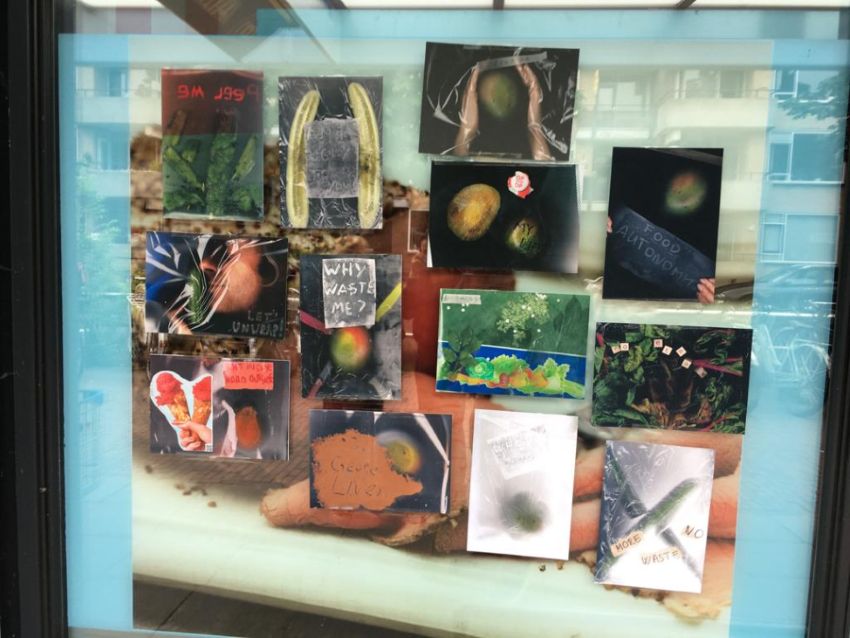

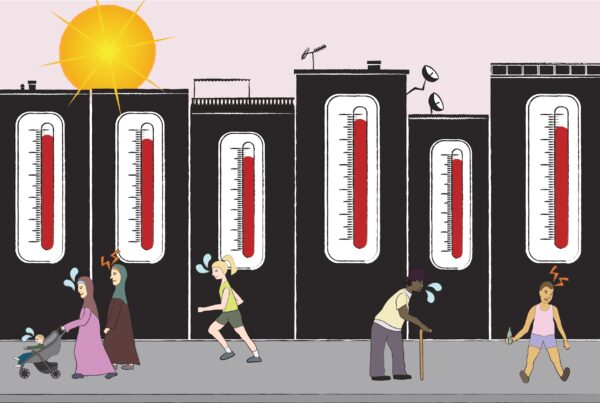
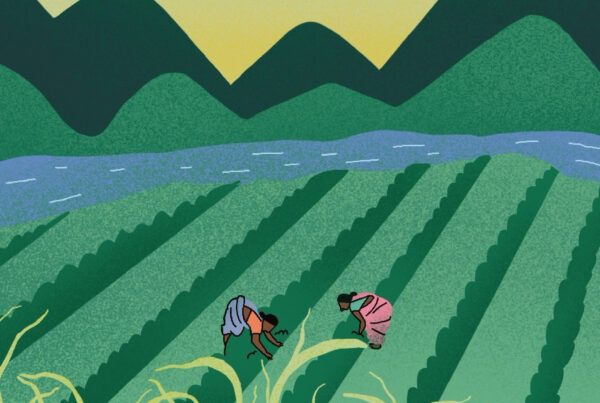
One Comment